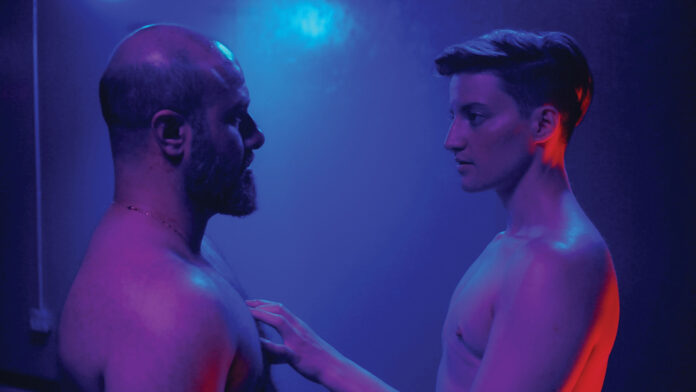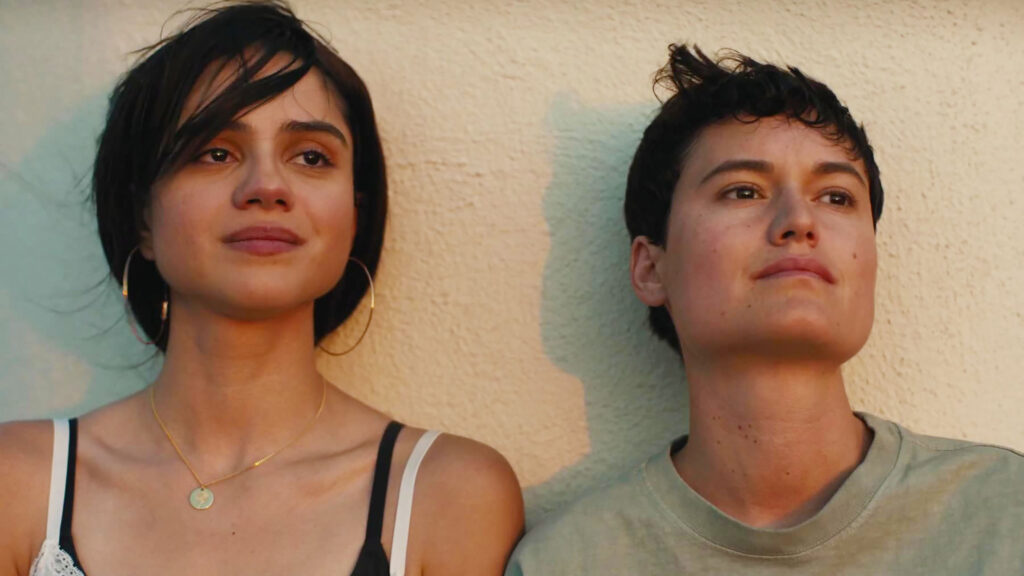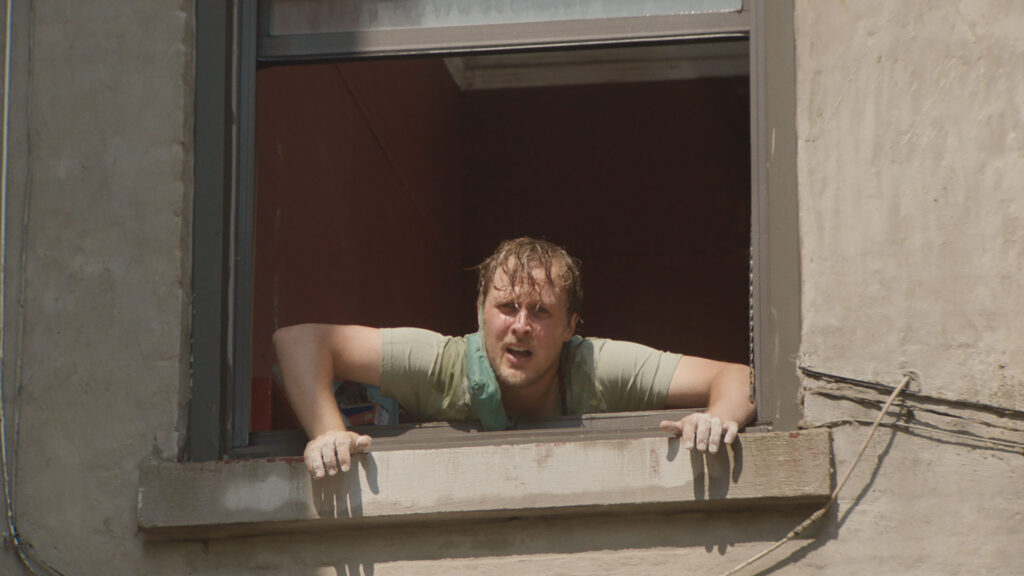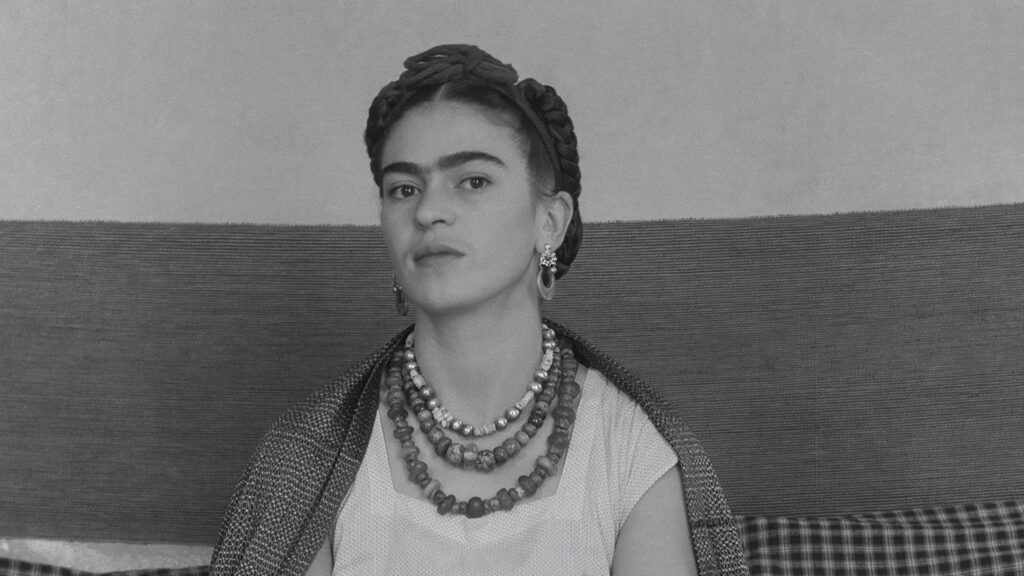
Dozens of new queer-focused documentaries, features, and shorts premiered at this year’s Sundance Film Festival. Here is a rundown of a handful of LGBTQ+ films that screened as part of this year’s program.
“In the Summers” is a knockout feature debut by the queer writer/director Alessandra Lacorazza. Set entirely in Las Cruces, NM, the film chronicles two sisters, Eva (Luciana Elisa Quinonez as a child; Allison Salinas as a teen; and Sasha Calle as a young adult) and the queer Violeta (Dreya Castillo/Kimaya Thais/Lio Mehiel), as they visit their father, Vincente (René Pérez Joglar) several times over a ten-year period. The first summer is mostly fun and games, but things get more distant and awkward as various changes take place during or between visits. Violeta becomes more defiant and develops a crush on Camila (Gabriella Surodjawan as a teen; Sharlene Cruz as a young adult); Eva feels lonelier; and Vincente struggles with addiction. Every frame in the film, from the clutter and deterioration of the house to the vast landscape, such as when Vincente shows his daughters the stars at night or takes his family to White Sands, provides a real sense of place. But what makes “In the Summers” so moving, however, is all that goes unsaid. This finely observed drama builds to a quietly powerful final sequence that may just prompt tears.

Written, directed and edited by Jules Rosskam, “Desire Lines” is an illuminating docu-fiction film about transmasculinity. Several narrative strands are used to explore the topic, including episodes set in a fictional bathhouse in the 1980s, scenes of an Iranian trans researcher, Ahmad (Aden Hakimi), visiting a contemporary queer archive staffed by Kieran (Theo Germaine), as well as candid interviews with nearly a dozen trans men. There are also archival clips of interviews and letters to “transcestor” Lou Sullivan, who is introduced as “the first transgender man to publicly identify as gay.” Rosskam seamlessly interweaves each of these threads to comment on queer identity and sexuality. The subjects, both real and fictional, past and present, candidly express how they think of themselves, their experiences of dysphoria, and how they came to terms with their transness. But there are also valuable discussions about “desiring transness” and how these individuals actualize their desires, feel fetishized, feel alienated within the queer community, or feel objectified because of their race, gender, or sexual stereotypes. Additionally, “Desire Lines” provides overlapping storylines about trans experiences with HIV. This fascinating film is both experimental and ambitious, and it succeeds brilliantly.
The excellent character study “Sebastian” has Max (Ruaridh Mollica), a writer, secretly working as Sebastian, an escort. He is performing sex work as research for a novel he hopes to publish. Of course, his side hustle (no pun intended) distracts from his freelance work for a magazine, and it is only a matter of time before his two worlds collide. Writer/director Mikko Makela includes a line that acknowledges that a sex worker is a “stock character in queer literature” (as well as in film). Even so, “Sebastian” remains interesting because of how Max handles the personal and professional conflicts he faces. Is he being self-destructive and feeling shame about living a double life? As he gets more involved with one particular client, is Max getting too deep into his work? Mollica’s high-wire performance blurs the lines — he is sexy and confident one minute and full of anxiety the next. “Sebastian” may not add anything new to the sex worker narrative, but the film remains captivating because Mollica exudes charisma and makes viewers care about Max even when he is at his worst.

“Stress Positions” is trans writer/director Theda Hammel’s clever and very funny comedy about Terry (John Early), who is first seen rolling a giant disco ball — like a gay Sisyphus — out of his soon to be ex-husband Leo’s (John Roberts) Brooklyn house. Set in summer 2020, Terry is homebound because he is isolating during the pandemic and caring for his nephew, Bahlul (Qaher Harhash), a straight teenage model from Morocco who has a broken leg. Terry’s best friend Karla (Hammel), however, creates some chaos when she tells Leo about Bahlul and cheats on her girlfriend Vanessa (Amy Zimmer) with Ronald (Faheem Ali). The laughs are generated from slapstick moments involving Terry throwing his back out (repeatedly), some dexterous wordplay, and a running gag about countries in the Middle East. There is also a narrative about Bahlul’s memories of his mother that adds a wistfulness that balances out some of the cringe-inducing humor. Early’s expressions and physicality are perfectly pitched, and Hammel shrewdly plants gags that have a nice payoff later.
“Sue Bird: In the Clutch” is an entertaining documentary about the inspiring WNBA superstar Sue Bird. The film, directed by Sarah Dowland, uses interviews and archival footage to look back on Bird’s life and extraordinary career during her last season as a point guard on the Seattle Storm. Bird achieved initial success playing in college at the University of Connecticut, where she won a championship before being the first draft pick for the Storm. Taking that WNBA team to a championship was also rewarding. But the league and women’s sports do not offer the same opportunities that men’s athletics do, and Bird explains that she played in Russia to earn money. She also competed in the Olympics, winning several gold medals over the years. But what comes across in the film is that Bird is a humble player who was a leader for her teammates on and off the court. After Bird came out (in 2017)—her fiancée is Megan Rapinoe—she used her fame and platform to advocate for a collective bargaining agreement and spoke out against racism, sexism, and homophobia. “Sue Bird: In the Clutch” may be a hagiography, but as the film shows, Sue Bird is deserving of the acclaim.

“Frida” uses painter Frida Kahlo’s letters, writings, and illustrated diaries to provide a documentary portrait of the artist. While photographs, her artwork, archival footage, and animation are used to illustrate her life and career, the only examination of Kahlo’s bisexuality is a remark that her philandering husband Diego Rivera, “Approved of her relationships with women.” The film explores the inspiration for her work and recounts her numerous health difficulties. Alas, there is too little made of Kahlo’s thoughts on gender and sexuality — she dressed “like a man” as a rebellious youth and she felt that her career was hampered because she was a woman. As such, “Frida” feels like an unfinished sketch. But at least the images are great.
.
